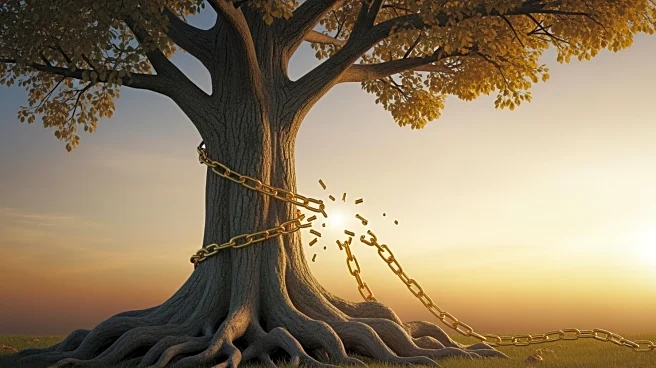What's Happening?
Oasis has embarked on a global reunion tour, with a recent performance at MetLife Stadium in East Rutherford, New Jersey. The band, led by brothers Noel and Liam Gallagher, is reuniting after their split in 2009. The tour has been highly anticipated, with fans eager to see the iconic Brit-pop group perform their classic hits like 'Wonderwall' and 'Don't Look Back in Anger.' The reunion is marked by a sense of nostalgia and excitement, as the band brings their music to a new generation of fans. The Gallaghers, along with original guitarist Paul 'Bonehead' Arthurs and other band members, delivered a powerful performance, showcasing their enduring chemistry and musical prowess.
Why It's Important?
Oasis's reunion tour is significant for the music industry, highlighting the lasting appeal of Brit-pop and the band's influence on rock music. Their return reflects a broader trend of nostalgia-driven tours, appealing to fans who grew up with their music. The tour also underscores the potential for successful reunions, as bands capitalize on their legacy and fan base. For audiences, the performances offer a chance to relive the band's iconic songs and experience the energy of live music. The reunion may inspire other bands to consider similar comebacks, reshaping the concert landscape and attracting diverse audiences.
What's Next?
The Oasis reunion tour is expected to continue, with performances scheduled across the globe. Fans are eagerly anticipating more shows, hoping for additional surprises and new music from the band. The tour may lead to further collaborations and projects, as the Gallaghers explore opportunities to expand their musical repertoire. Industry observers are watching closely to see how the reunion impacts the band's legacy and future endeavors. The success of the tour could pave the way for more nostalgia-driven events, influencing the direction of live music experiences.
Beyond the Headlines
The reunion raises questions about the dynamics between Noel and Liam Gallagher, known for their contentious relationship. Their ability to reconcile and perform together highlights the complexities of band reunions and the challenges of maintaining creative partnerships. The tour also reflects broader cultural trends, where nostalgia acts are increasingly popular, appealing to audiences seeking familiar experiences. This could lead to more reunions and collaborations among artists from the 1990s and 2000s, reshaping the music landscape. Additionally, the tour may inspire discussions about the evolution of rock music and its cultural significance.









